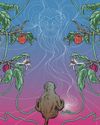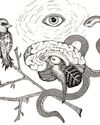Hamid Andishan tells us how Sartre, a philosopher of freedom, had problems with the politics of the land of liberté, and how this affected his view of human rights.

Have you ever heard of someone loving and hating something at the same time? It can lead to madness,or at least, to profound anguish. The situation becomes worse if that thing is one’s motherland. Jean-Paul Sartre was in such a situation. He was a French philosopher against France. Philosophical offspring of Rene Descartes and admirer of Honore de Balzac, he fought for France in WWII, and was a prisoner of war in Germany; but after the war he turned into a bitter critic of French policy. Why?
Sartre had witnessed how France – the land of liberty, equality and fraternity – had acted as a colonial predator in Algeria, Cameroon, and Indochina. In the first editorial of his journal Les Temps Modernes in 1945, Sartre and the phenomenologist Maurice Merleau-Ponty declared that members of the French Resistance who had fought to liberate France during WWII, and who were now in Indochina, were like the German soldiers fighting for fascism. Paris was to him the symbol of freedom against the machinery of fascism (see The Liberation of Paris, 1945), but barely a week after Hitler’s death, the same city of romance and freedom sent troops to commit a bloody massacre in the Algerian market town of Sétif, slaughtering thousands of Algerians. In the years that followed, civilized France continued to brutally repress the growing anti-colonialist movement, frequently sentencing people to death in military courts. This led Sartre to declare, “we are all murderers” in an article of that title published in Les Temps Modernes, No.145, 1958:
This story is from the {{IssueName}} edition of {{MagazineName}}.
Start your 7-day Magzter GOLD free trial to access thousands of curated premium stories, and 9,000+ magazines and newspapers.
Already a subscriber ? Sign In
This story is from the {{IssueName}} edition of {{MagazineName}}.
Start your 7-day Magzter GOLD free trial to access thousands of curated premium stories, and 9,000+ magazines and newspapers.
Already a subscriber? Sign In

Anselm (1033-1109)
Martin Jenkins recalls the being of the creator of the ontological argument.

Is Brillo Box an Illustration?
Thomas E. Wartenberg uses Warhol's work to illustrate his theory of illustration.

Why is Freedom So Important To Us?
John Shand explains why free will is basic to humanity.

The Funnel of Righteousness
Peter Worley tells us how to be right, righter, rightest.

We're as Smart as the Universe Gets
James Miles argues, among other things, that E.T. will be like Kim Kardashian, and that the real threat of advanced AI has been misunderstood.

Managing the Mind
Roger Haines contemplates how we consciously manage our minds.

lain McGilchrist's Naturalized Metaphysics
Rogério Severo looks at the brain to see the world anew.

Love & Metaphysics
Peter Graarup Westergaard explains why love is never just physical, with the aid of Donald Davidson's anomalous monism.

Mary Leaves Her Room
Nigel Hems asks, does Mary see colours differently outside her room?

From Birds To Brains
Jonathan Moens considers whether emergence can explain minds from brains.